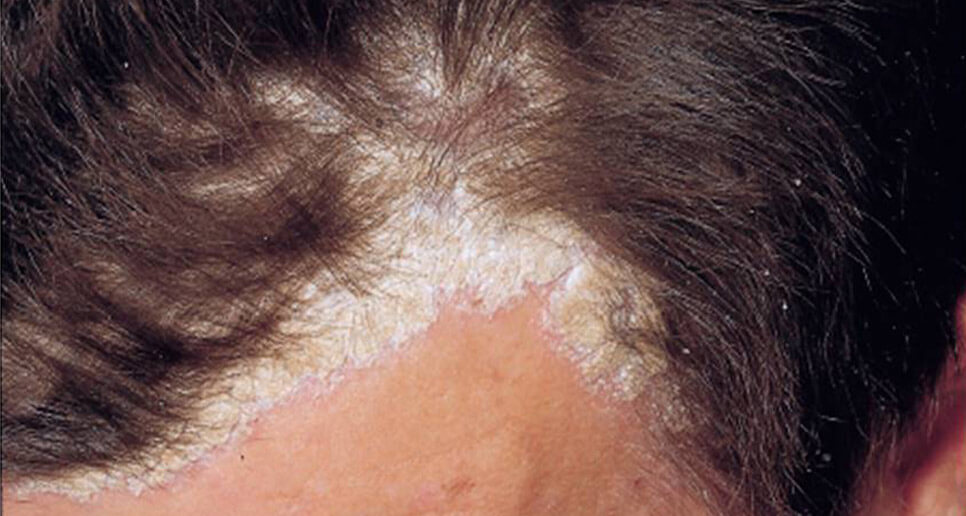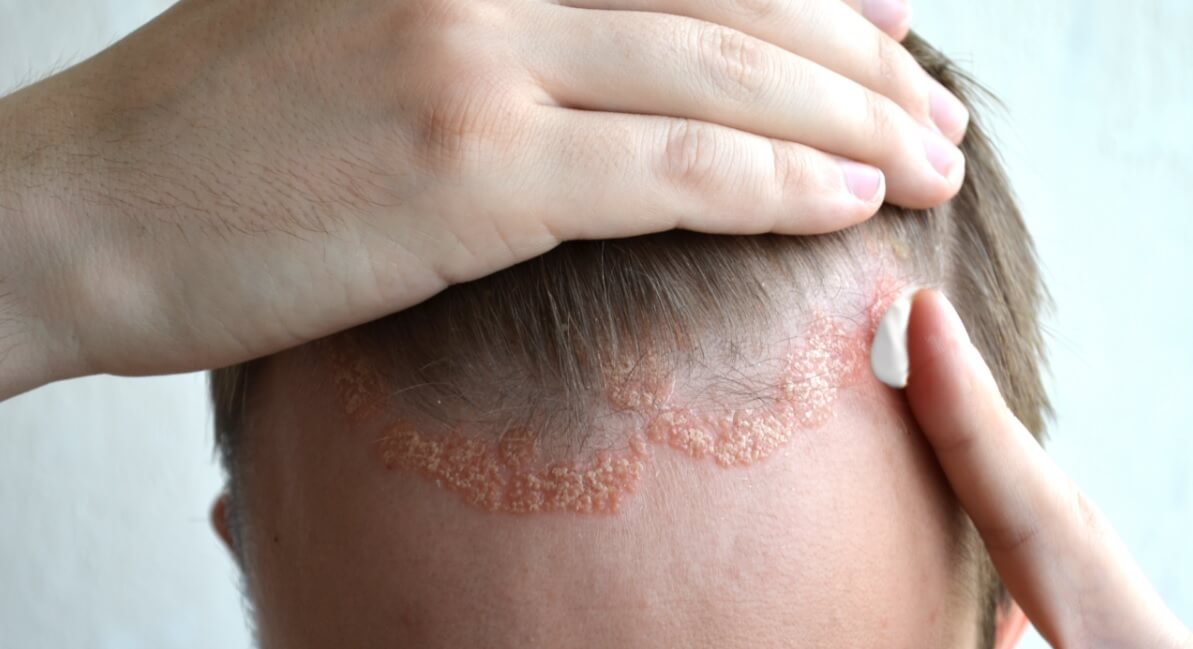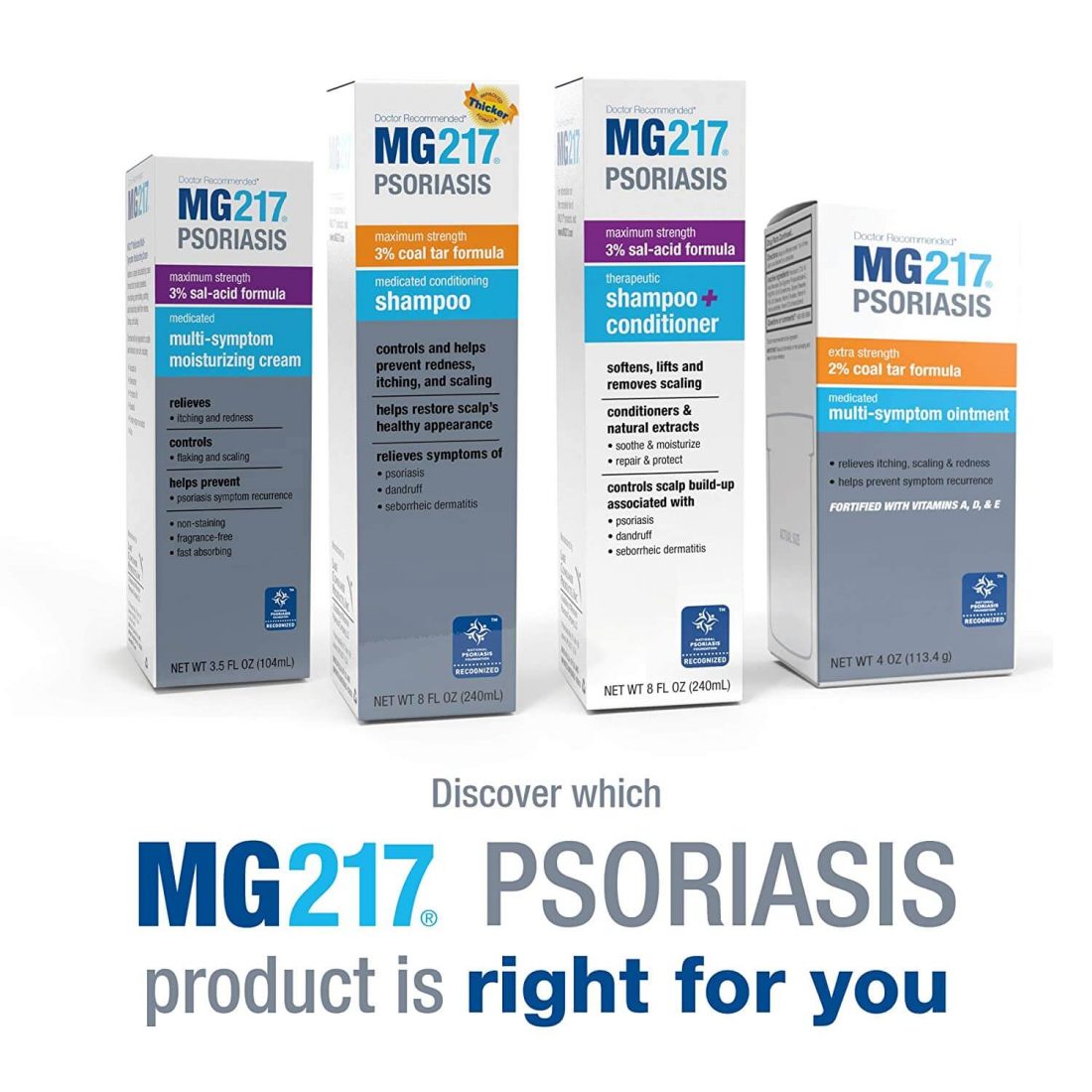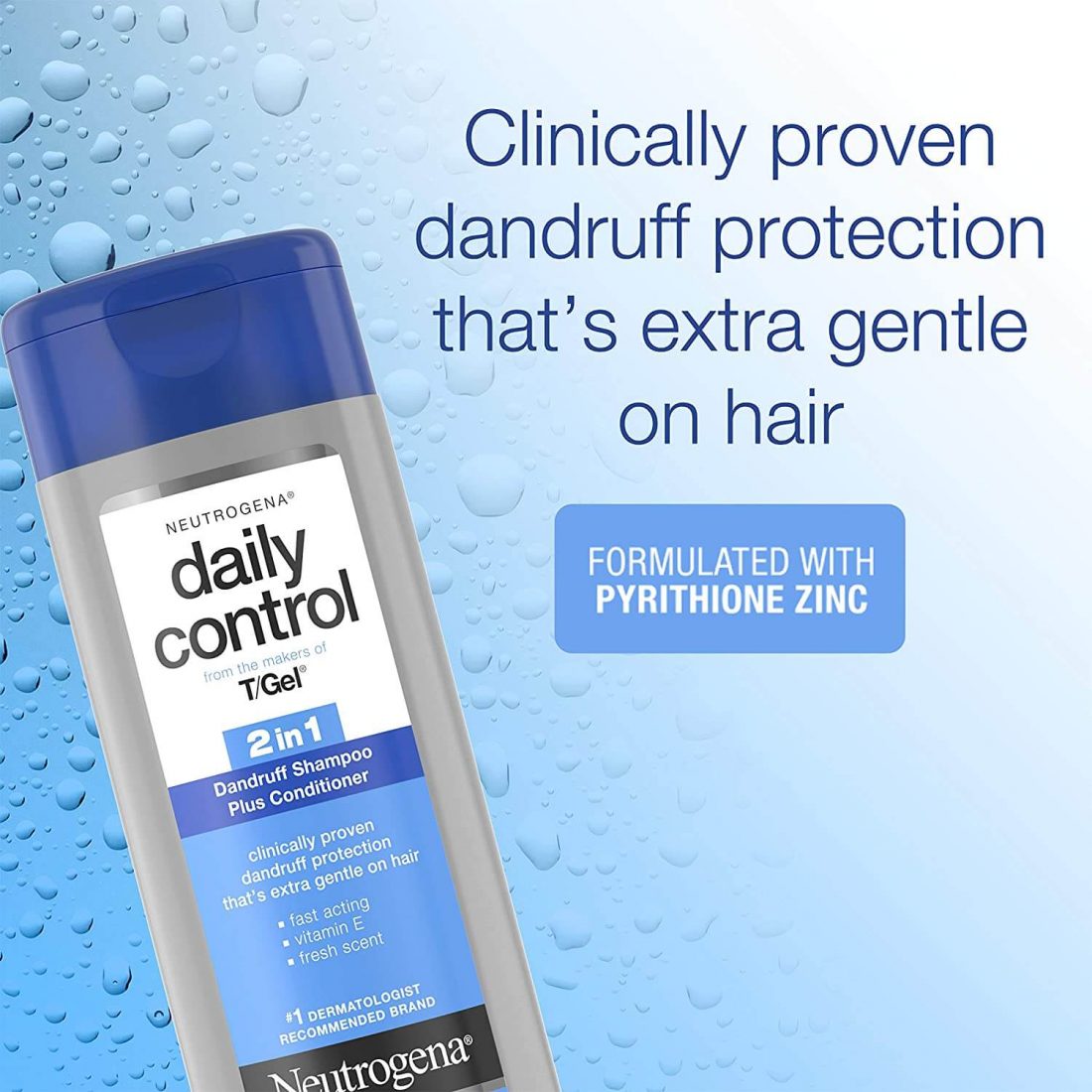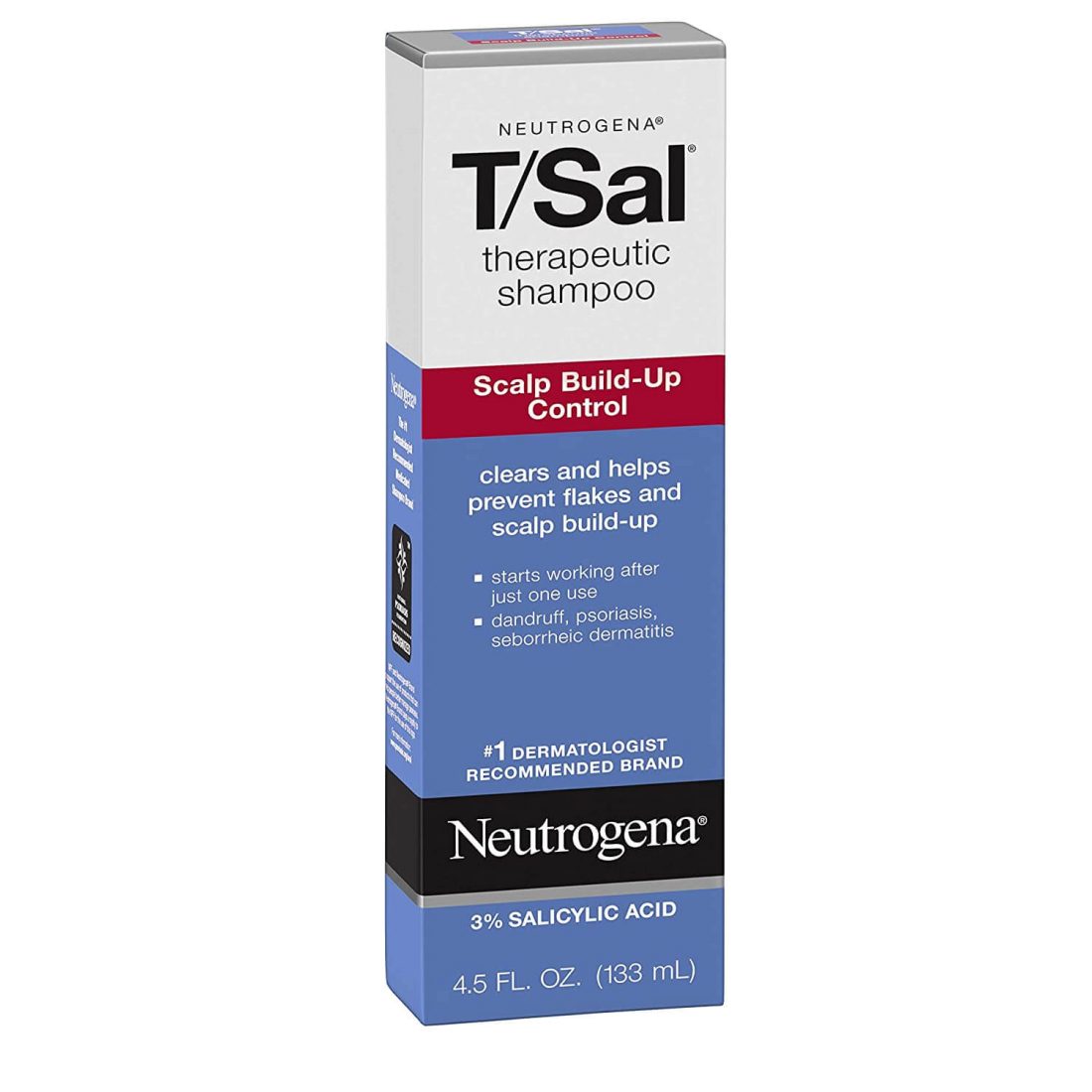The best treatment for scalp psoriasis is determined by the severity of the disease. Let’s first consider what scalp psoriasis is and what causes it.
Page Contents
What is Scalp Psoriasis?
Psoriasis affects the scalp and forehead in more than two-thirds of psoriasis patients. This makes these areas by far the most frequently affected regions of the body by psoriasis – regardless of age, gender, or stage of the disease.
Often the inflammation centers of psoriasis on the head reach beyond the hairline. Then the disease also leaves traces on the face. This is doubly uncomfortable for those affected, as these areas are difficult to conceal.
For example, a typical area where scalp psoriasis becomes visible is the forehead near the hairline. However, the temples and neck can also be affected. The foci are reddish in color, have a lot of scales, and often cause unpleasant itching.
In some cases, psoriasis on the head can also lead to temporary hair loss. Hair loss is not caused by scalp psoriasis; it is brought on by treating the scalp harshly by acts of scratching the itchy scales too hard or picking off scales.
These symptoms make psoriasis on the scalp a condition that can seriously affect the wellbeing and self-confidence of those affected – especially if the psoriasis is visible on the face. For this reason alone, patients should be treated early.
If scalp psoriasis is not treated timeously, the risk of psoriasis-related hair loss increases. In addition, scalp psoriasis is sometimes associated with psoriasis in or on the ear.
What Causes Scalp Psoriasis?
The exact causes for the development of psoriasis on the scalp have not yet been clarified. Studies show that the predisposition to psoriasis on the scalp is hereditary. However, the skin disease only breaks out if other factors are added.
This includes:
- Stress and emotional distress,
- Infectious diseases,
- Climate change, sunburn,
- Excessive alcohol consumption,
- Medication (for example heart and high blood pressure drugs),
- Skin injuries, burns, accidents, operations,
- Hormonal changes, for example during menopause,
- Certain foods (products made from wheat flour, white sugar, milk, fish, pork).
What Are the Types of Scalp Psoriasis?
Different types of scalp psoriasis do not exist. The condition however appears in 3 different forms of severity. The treatment for scalp psoriasis is subsequently determined by the severity of the outbreak.
In the mild form of scalp psoriasis, less than 50 percent of the scalp is affected. Dandruff, redness, and itching are mild.
The moderate form also affects less than 50 percent of the scalp, but the symptoms such as itching, flaking, and redness are more pronounced than in the mild form.
The severe form of scalp psoriasis is visible over a large area (more than 50 percent), the external signs are most evident here.
Below are some scalp psoriasis images for easy identification:
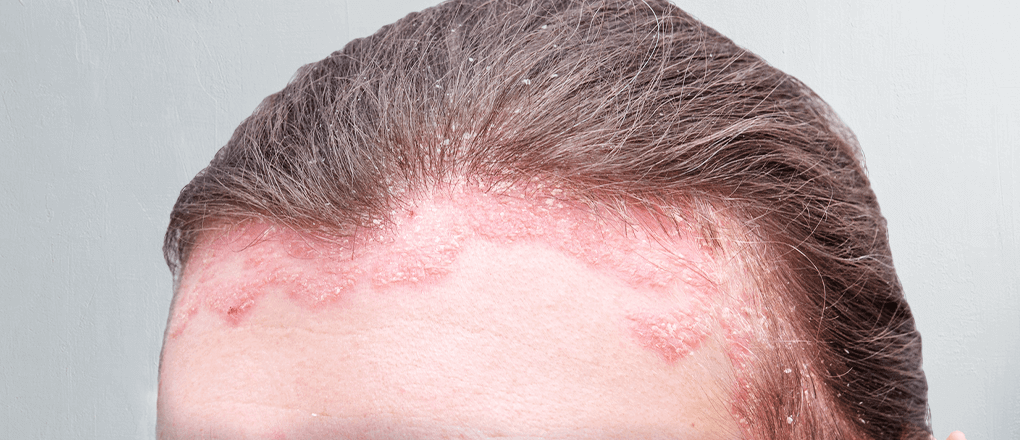
Treatment for Scalp Psoriasis
How do you treat scalp psoriasis?
Scalp psoriasis is often more difficult to treat than other forms of psoriasis due to hair on the affected areas. Medication must reach the scalp and should not be applied over a large area, but rather in a targeted manner.
Ointments and lotions are difficult to reach the scalp due to the thick layer of flakes located there. Also very greasy ointments with, for example, petroleum jelly are less suitable – especially on a hairy scalp – because they cannot be washed out properly.
If you suffer from thick scales, it is necessary to remove them first, otherwise, the treatment of psoriasis will take much longer or will not work.
Thick flakes stop the anti-psoriasis agents you have been prescribed as it prevents the active substance from reaching the skin.
Basically, there are four different forms of psoriasis treatment for the scalp. External use with 1) shampoos, 2) light therapy, 3) topical medications (creams or ointments), and 4) biologics (systemic medicines).
How to Remove Psoriasis Scales From the Scalp
Follow these 3 steps to a healthy scalp:
1. Soak the flakes on the scalp
The flakes come off best when you soak them overnight using a scaling ointment.
OTC products that contain ingredients such as lactic acid, zinc pyrithione, salicylic acid, selenium sulfide, or urea are great at softening the scales. You do not need a prescription. You can massage this solution into the scalp during the day also to soften the flakes for gentle removal.
It is recommended to apply the “soaking” solution at night so it can work while you sleep.
2. Remove loose flakes from your hair
The next morning you will notice that the flakes have (partly or completely) soaked off. You can now wash the loosened flakes out with a specially formulated scalp psoriasis shampoo which contains coal tar or clobetasol propionate.
Coal tar inhibits inflammation and will reduce flakiness, itching, and swelling. It also has a mild disinfectant effect.
Clobetasol propionate is a powerful adrenal cortex hormone that can reduce inflammation in the scalp and also reduce scaling, itching, and swelling.
These shampoos are available at drug stores without a prescription but it is imperative you read and follow usage instructions before use.
Denorex Rx shampoo. This shampoo contains, among other things, a coal tar extract that removes grease and flakes and combats itching.
3. Treatment after removal of flakes
After you have washed the hair with specially formulated shampoo and rinsed out any ointment residues and flakes, you can treat the scalp with a special lotion, gel, or liniment.
The drugs prescribed by your doctor usually contain corticosteroids that combat itching, redness, and flaking.
These products are best applied when the hair is still wet. You can part your hair with ease using a comb, especially in the areas affected by flakes.
For best results put a drop of the prescribed ointment on your finger and then massage it into the skin at the spots where you parted the hair.
The agents work best when the flakes have been removed.
Examples are Topicort topical (Desoximetasone) and Elocon cream (Mometasone).
To obtain the best results, repeat these 3 steps every day for a period of at least 2 weeks. Once most of the flakes are gone and only redness exists, you can skip step 1.
However, should thick flakes appear again, you should repeat all 3 steps.
1. Scalp psoriasis shampoo treatment
There are very good working shampoos that contain the active ingredient zinc and thereby reduce the build-up of dandruff. Get advice from your dermatologist or pharmacy about a product that is right for you.
Compared to other skin diseases, tar preparations are still used in psoriasis treatment. Coal tar has proven to be particularly effective, as it can slow down cell division and relieve itching and fight bacteria and fungi. Tar preparations are used for very stubborn dandruff on the head area.
Possible side effects of scalp psoriasis shampoos:
Side effects do not, or hardly ever occur. Local irritation or redness may occur from the coal tar shampoo, but these symptoms are not perceived as a nuisance by patients.
Most people who carry out the treatment according to the instructions show a visible improvement after just 2 weeks. So your effort will be rewarded.
It is important not to use any psoriasis remedies other than those prescribed by your doctor.
When should you notify your doctor?
This treatment usually does not cause any complications.
A hypersensitivity reaction to one or more of the components of the topical agents used can always occur. However, this is very rare.
You can recognize this by an increase in redness, itching, swelling, wetting, and blistering. If this occurs, discontinue all means and report the incident to your physician.
2. Light therapy for scalp psoriasis
In many cases, treatment by Ultraviolet (UV) light is used. Before doing this, it is also necessary to loosen the scales from the scalp.
This can be done with the help of a UV comb which delivers the UV light directly to the scalp. With this rod-shaped device, the healing ultraviolet light can be directed precisely to the head.
With the UV light comb, the hair is parted during the application, and the healing rays reach the diseased skin directly.
The UV light slows down abnormal cell division that is too fast, which leads to lichen and itchy dandruff.
3. Topical creams and ointments
Another treatment option is the so-called vitamin D3 derivatives, such as calcipotriol and tacalcitol. These active ingredients inhibit the rapid division of skin cells typical of psoriasis.
They promote normalization of the cornification and have an anti-inflammatory effect. Particularly pleasant to use: the gels are quickly absorbed and leave no traces of grease.
Special ointments with vitamin D3 have been developed that work just as well as cortisone, but do not have any side effects.
Cortisone is a highly effective anti-inflammatory drug and is therefore particularly effective against moderate psoriasis. In this way, the inflammation can be fought quickly and the associated dandruff plague is contained.
The cortisone active ingredient is usually applied in liquid form to the affected areas of the skin without greasing the hair. Depending on the level of inflammation, cortisone is prescribed in pure form, in a diluted form, or in a fixed combination with other active ingredients.
Preparations that contain vitamin D3 derivatives or a combination of vitamin D3 derivatives with cortisone are suitable for a longer period of use of up to one year.
Pure cortisone preparations, on the other hand, are not suitable for permanent external use for scalp psoriasis.
4. Biologics (systemic medications)
For the moderate to severe form of psoriasis on the scalp, systematic biological agents are probably the best treatment for scalp psoriasis that can be prescribed by the doctor when external treatment does not improve the symptoms.
Biologics can then be used if the basic therapy has not worked.
For the sick, they have the advantage that they usually work after a few days and can even bring the disease to a standstill if used early.
Biologics specifically trap certain inflammatory substances in the immune system and switch them off.
Systemic medications have active ingredients that specifically slow down or stop inflammatory processes, and are administered in either tablet form or by injection.
Scalp Psoriasis Natural Treatment
The Best Natural Treatment Options for Scalp Psoriasis
Some people with scalp psoriasis seem to benefit from natural treatment. You can make a mask for your scalp yourself and let it soak in for desired effects. For example:
- Yogurt and banana: hydration of the scalp, restore pH of the skin, less itching and burning, and fewer flakes.
- Aloe Vera and olive oil: fewer crusts, dryness, and irritation.
- Garlic and Coconut Oil: anti-inflammatory, cleansing the scalp, hydration, better circulation.
- Oats and Honey: hydrates the scalp, removes dead skin cells, less irritation and itching, and fewer flakes.
- Apple cider vinegar improves circulation, restores the pH balance of the skin, and softens the flakes.
To find out which one works best, try them all.
How to Prevent Psoriasis on the Scalp
- Treat your scalp with oil-based ointments. This helps to loosen flakes from the scalp and fall off, making treatment agents penetrable to the skin of the scalp.
- Prevent stress and try to relax more often. Relaxation on vacation has a positive effect on psoriasis. An added benefit of sea vacation: saltwater and vitamin D – which is formed under the influence of sunlight – also reduce psoriasis symptoms.
- Try not to scratch if your scalp is itchy. When your skin is damaged, new patches of psoriasis can develop.
- Quit smoking. During smoking, many free radicals enter your body that may trigger the condition.
- Drink less alcohol. Alcohol dehydrates your body, making your skin drier and more likely to cause psoriasis to flare up.
- It is particularly important not to unnecessarily irritate the scalp with psoriasis – this can make the symptoms even worse. Therefore try to scratch as little as possible, even if the itching seems to be almost unbearable.
- You should limit the styling of your hair severely: Avoid coloring, tinting, blow-drying your hair, and using no hairspray.
- Also, be sure to wash your hair very gently.
- A natural bristle brush is best for detangling the hair.
- You should only choose hairstyles that stress the scalp as little as possible – you should avoid a tight ponytail or tight bun.
- Among other things, zinc is important for a healthy scalp. Oat flakes, oysters, lentils, or liver contain a particularly large amount of zinc.
- Alcohol, wheat flour, and sugar, on the other hand, should be avoided: They favor the climate for skin fungi, which can lead to dandruff.
